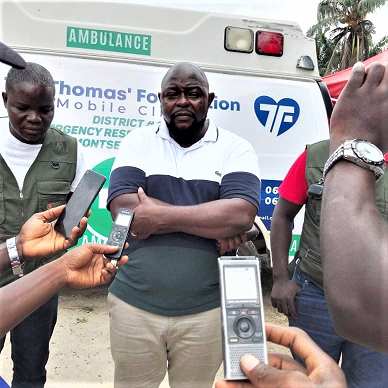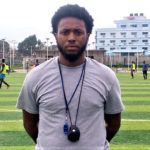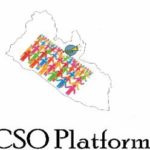Montserrado County District #4, an overpopulated district, with fewer facilities, mainly health for its citizens’ well-being is challenged. The Thomas Foundation is a humanitarian organization that has come in the wake of the difficulties to buttress government efforts to impact the lives of the people in the district.
As the 4.5 million population of Liberia is challenged in a number of ways, the Majority of the citizens lack electricity, pipe-borne water, quality education, and good hospital, among others.
Liberians’ poor health sector is a result of the health nightmare by the negligence and inaction of previous and present governments.
The mission of the Ministry of Health is to “reform and manage the sector to effectively and efficiently deliver comprehensive, quality health services that are equitable, accessible and sustainable for all the people in Liberian”. Its vision states that “healthy population and social protection for all”.
What seemed to be a fiasco and is not impactful nationwide, as district #4 is no exception, the district lacks basic necessities. It has no pipe-borne water, health facilities, hand pump, or public latrine, among others.
“The district is seriously challenged, most of the people the elderly, and youth all don’t have the cash to go to the hospital. Some can’t afford medical drugs and so we are here to take the medical service to their doorsteps to impact their health need”, Atty. Thomas said in a patriotic tone.
The Government hospitals and schools are not common in every district of each county nationwide as other African countries have. As a result, Liberians who are eager to check their medical status regularly are unable to do so due to the inadequacy of health facilities and poor medical dispensation.
“They are more passionate about their health and thronged here awaiting medical service because the national government is challenged, we are buttressing their mission”, Atty. Thomas said.
He noted that the country lacks adequate doctors and nurses since Ebola hit the health sector in 2014. The situation left the sector vulnerable and unsettled and is impaired today by the Covid-19 pandemic, according to medical practitioners.
“Liberia, a small country on the Western African coastline, is emerging from an Ebola epidemic that overwhelmed its healthcare system. It currently has one of the world’s lowest physician-to-population ratios,” according to Yale capstone student recommendations for national medical education reform.
The World Health Organization (WHO) recommends a 1:1,000 doctor-to-patient ratio for adequate healthcare service, yet according to a 2016 report by the Liberia Medical and Dental Council, the country has just 298 medical doctors to care for the country’s 4.5 million population, currently the country’s doctor or patient ratio is 1: 15,000.
The Foundation mobile clinic has had a medical impact on 10,000 plus Liberians and none Liberians in the district and outside of it, according to Atty. Thomas. Its ambulance offers free service for the district by patients calling.
In Leeward counties’ citizens often transport women in labor pain and severe sick persons in hammocks to nearby health facilities. Due to the far distances covered, pregnant women sometimes gave birth in the presence of young men who carried the hammock on their shoulders.
“Liberia needs 135 ambulances to cover the 15 counties. The Ministry of Health and Social Welfare currently has 60 ambulances, the President presented 15 ambulances to the counties making 75. We are encouraging others to donate to the health sector, especially the remaining 60 ambulances.”
In Grand Bassa County District #2 “B”, specifically Vambo and Marloi Townships, there is no safe drinking water, public latrine, clinic, and school structure for the citizens, leaving them vulnerable and forcibly drinking from creeks, ponds, and defecating in the bushes.
“However, taking pills and injections is not the only recipe for good health maintenance, the right to health extends further.”
According to the Office of the United Nations High Commissioner for Human Rights, through the Committee on Economic, Social and Cultural Rights, the body responsible for monitoring the International Covenant on Economic, Social and Cultural Rights, call these the “underlying determinants of health”, which include, safe drinking water and adequate sanitation, adequate nutrition and housing; healthy working and environmental conditions; health-related education and information; and gender equality.
Addressing the people’s medical needs in the district is not The Thomas Foundation’s only venture, but involves in district security operation, concerned disadvantaged youths’ service, education, economic empowerment, job creation, equal participation, integrity and accountability, and basic social services.
Meanwhile, the medical beneficiaries, which included children, women, old folks, and young adults in the Kpelleh Town and Rock Hill Communities, vociferated that since their existence in the district, no politicians, or philanthropists have offered free medical service in the district until The Thomas Foundation started recently.
The mobile clinic service targets typhoid, malaria, sugar, and infection, among other treatments.
“There are so many challenges and demands on our national budget, and the government cannot be everywhere every time. So we need citizens, NGOs, and humanitarians to provide for our people”, Thomas said.
Reported by: Ojuku Silver-tongue Kangar, Jr.
+231778397650/+231881378585 gbaduquansah@gmail.com




